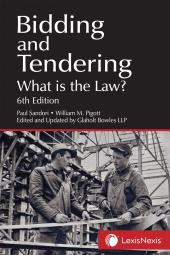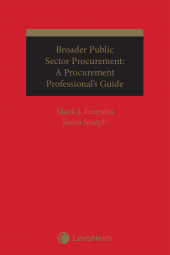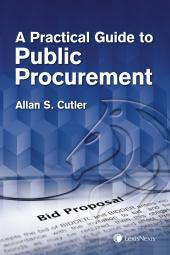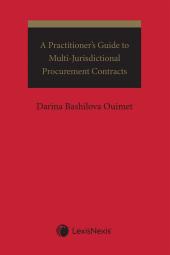Bidding and Tendering – What is the Law? 6th Edition
This edition will help readers learn from the moves and mistakes of others. It not only explains the basic legal principles but also provides updates on changes to construction law since publication of the widely referenced fifth edition in 2015.
One Year Subscription Only Terms
Subscribers receive the product(s) listed on the Order Form and any Updates made available during the annual subscription period. Shipping and handling fees are not included in the annual price.
Subscribers are advised of the number of Updates that were made to the particular publication the prior year. The number of Updates may vary due to developments in the law and other publishing issues, but subscribers may use this as a rough estimate of future shipments. Subscribers may call Customer Support at 800-833-9844 for additional information.
Subscribers may cancel this subscription by: calling Customer Support at 800-833-9844; emailing customer.support@lexisnexis.com; or returning the invoice marked 'CANCEL'.
If subscribers cancel within 30 days after the product is ordered or received and return the product at their expense, then they will receive a full credit of the price for the annual subscription.
If subscribers cancel between 31 and 60 days after the invoice date and return the product at their expense, then they will receive a 5/6th credit of the price for the annual subscription. No credit will be given for cancellations more than 60 days after the invoice date. To receive any credit, subscriber must return all product(s) shipped during the year at their expense within the applicable cancellation period listed above.
Détails des produits
The unique Canadian rules for bidding on construction projects – and just about everything else – have evolved rapidly ever since the Supreme Court of Canada's landmark Ron Engineering decision in 1981. The decision has spawned well over a thousand lawsuits, with many more likely. Lawsuits can be very costly for both bidders and owners. Lengthy examinations for discovery and testimony before judges can add cost in time to cost in money. How do you avoid a lawsuit when preparing a call for bids or bidding on a project? The expert commentary in this text analyzes the current state of the law to assist you and your clients through the bidding and tendering process.
The case summaries supply detailed information on how each dispute arose and developed, not just the legal principles and court outcomes; this is essential info for construction professionals who are trying to avoid lawsuits. Parties cannot be guided by general legal principles; they need to know what actions to take and what actions to avoid in bidding situations. For lawyers, this book is a quick guide not only to the key court decisions but also to many run-of-the-mill decisions which may reflect fact situations similar to those they face with in a particular dispute.
Bidding and Tendering – What is the Law? 6th Edition will help readers learn from the moves and mistakes of others. This edition not only explains the basic legal principles but also fully updates readers on changes to construction law since publication of the widely referenced fifth edition in 2015. Discover the impact of recent cases, as well as selected earlier cases, including:
- What did the parties do?
- Why did they land in court?
- What was the court's decision?
- Why did the court make this decision?
- What lessons does it teach?
What’s New In This Edition
- New and expanded commentary on:
- Damages and other relief where a party who suffers a loss at the hand of a wrongdoer is entitled to compensation
- Post-bid negotiations and re-bidding
- Electronic bidding
- The importance of treating contract A like a contract
- Identifying and allocating risks by anticipating a breach of contract and providing for it in the actual contract
- How to create flexibility and/or discretion in a contract (i.e. treatment of the word “shall” and “may”)
- New and/or relevant case law rulings including:
- Confirming the test for compliance in the tendering process
- Criteria to determine whether parties entered into a formal tendering process leading to a Contract A, or simply a more informal RFP
- The owner’s right to investigate where a bid is compliant on its face when it was submitted, the owner could not disqualify the bid based on its erroneous understanding of information obtained following further investigation
- Whether an owner is entitled to rely on information it already knows to evaluate a bid, if that information is not specifically set out in the bid documents
- Whether an owner has a duty to investigate where lack of compliance is not obvious on the face of the bid
- Compliance under statute as opposed to common law
- Exploring the owner’s right to rely on past experience with the bidder
- The validity of reprisal clauses
- Situations where Contract A may arise even in the absence of a formal tender call
- The availability of judicial review of a public body’s decision following a tendering process where the decision affects a broad segment of the public
- Acceptable delivery time for a tender document
- The SCC’s recognition of the organizing principle of good faith that manifests itself in various doctrines governing contractual performance
- The validity of waiver clauses in a bid
Who Should Read This Book
- Project owners and government agencies who need tips on preparing effective bid documents, assessing bids for compliance, and avoiding litigation
- Contractors who need to understand compliance/non-compliance, and what the owner's duty of fairness means to contractors
- Subcontractors and suppliers who need to be aware of how Contract A between themselves and a bidding contractor is different from Contract A between an owner and a contractor
- Construction lawyers who need knowledge of current case law
- Architects and engineers who need to know what to include and what to avoid when preparing bid documents, how to advise their clients, and how to use Contract A as a contract
Table des matières
Chapter 1: The Way We Were
Chapter 2: Revolution in the Law of Bidding
Chapter 3: Duties and Rights of Owners
Chapter 4: Discretion, Omnibus and Reprisal Clauses
Chapter 5: Subcontractor Bids
Chapter 6: Supplier Bids
Chapter 7: Mistake in Bid
Chapter 8: Negligence and Misrepresentation
Chapter 9: Duties of Consultants
Chapter 10: Special Remedies
Chapter 11: Time of Bid Submittal
Chapter 12: Bid Compliance and Bid Evaluation
Chapter 13: Damages and Other Relief
Chapter 14: Troublesome Bid Issues
Chapter 15: The Way We Are Now
 Lexis Nexis
Lexis Nexis 



